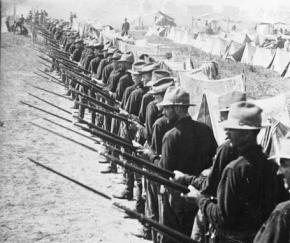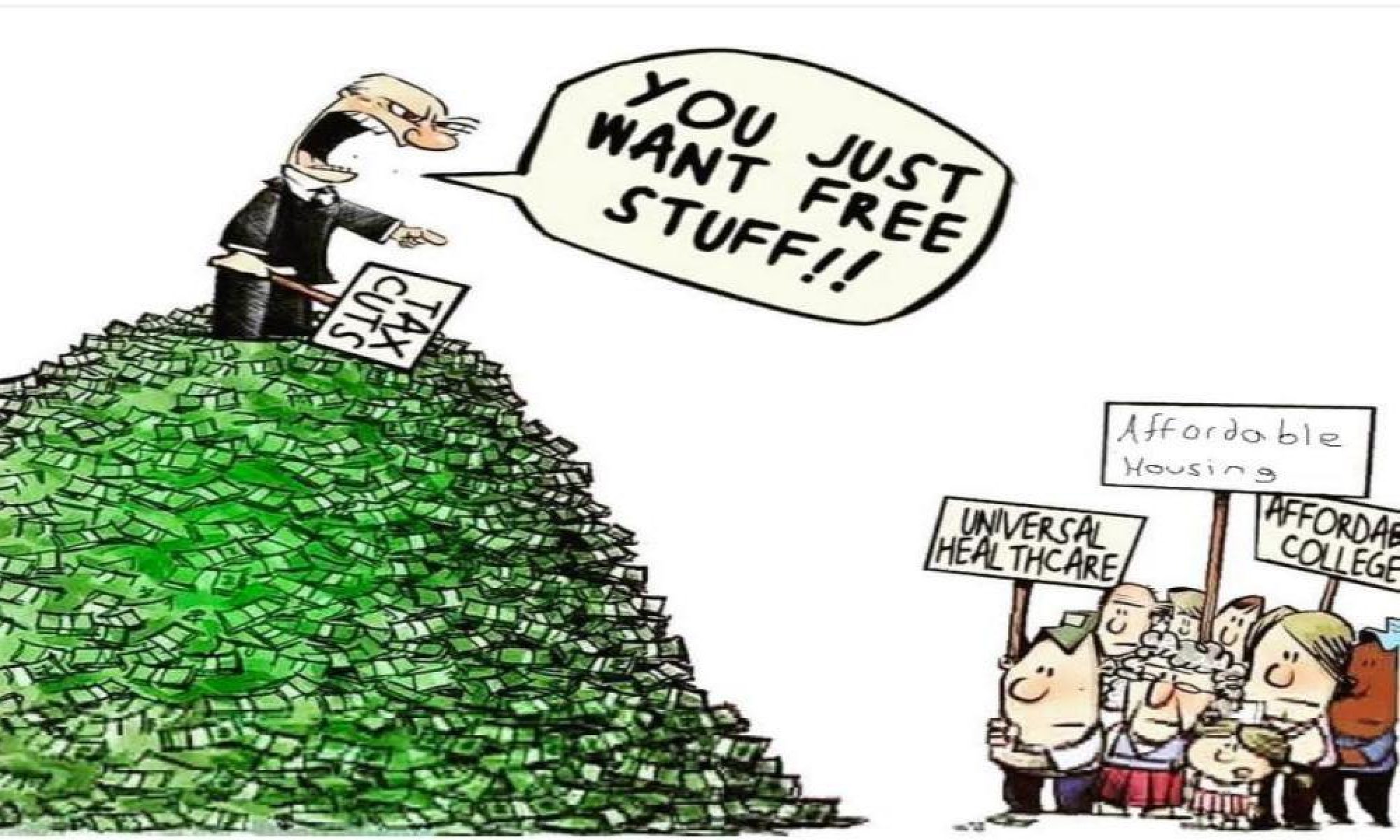(写在前面:先是看着西班牙帝国主义的暴行导致几十万古巴人惨死而无动于衷拒绝提供帮助,然后又在革命者快要胜利时宣布干预来摘桃子,美国帝国主义真是无耻啊。)
No struggle for liberation and democracy has ever benefited from U.S. military intervention–because Washington’s wars come at the price of perverting those aims.
没有任何争取自由和民主的斗争从美国的军事干预中获益过—因为华盛顿的战争是以扭曲这些目标为代价的。
THE UNITED States has a history of presenting its motives for military intervention in a good light–spreading democracy, fighting terrorism, deposing unpopular tyrants, protecting civilians and saving lives.
美国一直都有美化其军事干预动机的历史传统—传播民主,打击恐怖主义,推翻不受欢迎的暴君,保护平民和拯救生命。
In each case, the reasons the U.S. has concocted for public consumption to explain its decision to take military action differ substantially from the real aims of the operation.
在每个案例下,美国为公共消费而编造的以解释其采取军事行动的决定的原因都与该行动的真正目的非常不同。
Much can be learned from the way the U.S. behaved toward the Cuban independence movement against Spain in the late 1890s–which culminated in 1898 in the “splendid little war” that made the Philippines and Puerto Rico colonies of the U.S., and Cuba a protectorate.
从1890s后期美国对付对抗西班牙的古巴独立运动的方式可以学到很多东西—最终导致在1898年将菲律宾和波多黎各变成美国殖民地以及古巴成为保护国的“精彩小战争”中达到高潮。
AFTER THE Civil War, the U.S. emerged as a world economic powerhouse–though as a latecomer, its military power, political clout and colonial interests lagged far behind that of the European powers, particularly Britain and France.
在内战之后,美国成为世界经济强国—尽管作为后来者,其军事力量,政治影响力和殖民地利益远远落后于欧洲大国,特别是英国和法国。
As the end of the 19th century approached, the European powers were busy carving up the world into colonies and spheres of influence in an effort to secure sources of raw materials, cheap labor and protected markets. U.S. officials, politicians and business interests began clamoring for a foreign policy that would assert American naval and military power, particularly in the Caribbean, Latin America and the Pacific.
随着19世纪末的临近,欧洲大国们正在忙着将世界划分为殖民地和势力范围,以确保其原材料,廉价劳动力和受保护的市场的来源。美国的官员,政界人士和商业利益集团开始呼吁维护美国海军和军事力量的外交政策,特别是在加勒比海,拉丁美洲和太平洋地区。
“It makes the water come to my mouth when I think of the state of Cuba as one in our family,” wrote Frederick R. Coudert, a leading Wall Street figure, in 1895.
“当我把古巴的状态看作是我们家中的一员时,它会让水进入我的口中,”1895年华尔街主要人物Frederick R. Coudert写道。
A number of American investors were coming to dominate the lucrative Cuban sugar industry, and Cuba was seen as a strategically important island for controlling the Caribbean.
一些美国投资者开始主宰利润丰厚的古巴制糖业,古巴被视为控制加勒比地区的重要战略岛屿。
The famed Cuban revolutionary, José Martí, who had spent some time in the U.S. organizing a movement in exile against Spanish domination, welcomed the political and financial support of U.S. citizens for the Cuban cause.
着名的古巴革命家何塞·马蒂曾在美国组织流亡运动反对西班牙统治,同时欢迎美国公民对古巴事业的政治和财政支持。
But he was suspicious of U.S. designs on the island, writing in his last letter, not long before his death at the hands of his Spanish enemies in 1895: “It is my duty, inasmuch as I realize it and have the spirit to fulfill it–to prevent, by the independence of Cuba, the United States from spreading over the West Indies and falling, with that added weight, upon other lands of our America. All I have done up to now, and shall do hereafter, is to that end.”
但他怀疑美国在岛上的设计,写在他的最后一封信中,这距他在1895年在他的西班牙敌人手中死去不久:“这是我的责任,因为我意识到这一点并且有实现它的精神—通过古巴的独立,防止美国在西印度群岛蔓延,并以此增加的重量落在我们美洲的其他土地上。我迄今为止所做的一切,以及以后所做的一切,都是为了那个终结。“

“I have lived inside the monster,” he continued, referring to the U.S., “and know its insides–and my weapon is only the slingshot of David.”
“我一直住在怪物里面,”他继续指着美国说,“并且知道它的内部——而我的武器只有大卫的弹弓。”
The revolutionary war for Cuban independence begun by Martí and his cohorts in 1895 had widespread support in the U.S., fanned in part by the “yellow press” owned by media moguls like William Randolph Hearst, who supported U.S. intervention in Cuba and used his newspapers to press for it.
马丁及其同伙于1895年开始的古巴独立革命战争得到了美国的广泛支持,部分原因是像William Randolph Hearst这样的媒体巨头所拥有的“黄色新闻”,它支持美国对古巴的干预,并利用他的报纸推动这一切。
No doubt, the press had much to work with in making the case against Spain. After the triumphal march of the revolutionary armies through Cuba, Spain put Gen. Valeriano Wyler in charge: he immediately implemented his now infamous reconcentration plan. This decree gave eight days for all inhabitants of Cuba to move into towns occupied by Spanish troops and forbade the transfer of food from one place to another. The policy led to the deaths by disease and starvation of as many as half, and possibly more, of the 500,000 to 600,000 people affected by the transfer policy.
毫无疑问,媒体在制造反对西班牙的事件中做了很多。在革命军队通过古巴的胜利游行之后,西班牙让Valeriano Wyler将军负责:他立即实施了他现在臭名昭著的重新集中计划。 这项法令规定,古巴所有居民都只有八天时间迁入被西班牙军队占领的城镇,并禁止将食物从一个地方转移到另一个地方。 该政策导致受转移政策影响的50万至60万人中多达一半甚至更多的人由于疾病和饥饿死亡。
Throughout the war, however, the U.S. under President Grover Cleveland refused to recognize the Cuban revolutionary armies, and used its powers to prevent the flow of men, arms and supplies to them–in effect, aiding the Spanish. Many commentators at the time wrote of the fact that the revolutionaries could have easily defeated the Spanish before the U.S. invasion if they had been able to purchase munitions, food and medical supplies from America.
然而,在整个战争期间,美国总统格罗弗·克利夫兰拒绝承认古巴革命军队,并利用其权力阻止人员,武器和物资流入他们—这实际上是在帮助西班牙人。 当时许多评论员写道,如果革命者们能够从美国购买弹药,食品和医疗用品,那么在美国入侵之前,这些人可以很容易地击败西班牙人。
Nevertheless, these under-equipped, half-starving armies of guerrilla fighters, never totaling more than 30,000, but ably led by the likes of Máximo Gómez and Antonio Maceo, ran the Spanish ragged and seized control of dozens of towns and most of the countryside. By the time the U.S. made its decision to intervene, it was widely believed that it was only a matter of time before the Spanish were defeated anyway.
尽管如此,这些缺乏装备的,半饥饿的游击军队,总共不超过30,000人,但是由MáximoGómez和Antonio Maceo等人干练地领导,赶走了西班牙人并控制了几十个城镇和大部分乡村地区。 当美国决定进行干预时,人们普遍认为,无论如何西班牙人被击败只是时间问题而已。
There was a minority in the Cuban independence movement, such as Tómas Estrada Palma, the delegate of the Cuban Revolutionary Party stationed in the U.S., who supported some kind of American intervention on the grounds that only the U.S. could establish the conditions for stability and “law and order” necessary for Cuban business interests on the island. In the words of historian Philip Foner, Estrada “came to favor American intervention to prevent the revolution from becoming too revolutionary.”
古巴独立运动中有少数人,例如驻扎在美国的古巴革命党代表Tómas Estrada Palma,他支持某种形式的美国干预,理由是只有美国才能建立古巴岛上的商业利益需要的稳定的环境和“ 法律与秩序“。用历史学家Philip Foner的话说,Estrada“赞成美国的干预,以防止革命变得过于革命。”
This argument that independence would produce chaos–and in particular, a “race war,” which was a code phrase for the dominance of Blacks–was one of the reasons the U.S. justified both non-intervention, and then later, its right to assert control over Cuba.
这种认为独立将产生混乱的论点—特别是“种族战争”,这是对黑人统治的代码短语—是美国合理化不干预的理由之一,后来又成为了对主张对古巴的控制的合理化。
“There are…strong reasons to fear,” wrote Cleveland’s Secretary of State Richard Olney, “that, once Spain were withdrawn from the island, the sold bond of union between the different factions of the insurgents would disappear [and] that a war of races would be precipitated.”
克里夫兰的国务卿 Richard Olney写道:“有……强烈的理由担心,”一旦西班牙退出该岛,叛乱分子不同派别之间的联盟将会消失[和] 种族之战将会爆发。“
But Estrada’s support for U.S. intervention was not the position of the majority, especially those on the ground fighting in Cuba.
但Estrada对美国的干预的支持并不是大多数人的立场,特别是那些在古巴进行实地战斗的人们。
“We do not need any intervention to obtain victory in more or less time,” Antonio Maceo wrote eight months before he was killed, in December 1896, by Wyler’s troops. “Bring Cuba 25,000 to 35,000 rifles and a million bullets…We Cubans do not need any other help.”
“我们不需要任何干预就可以在更长或更短的时间内获得胜利,”Antonio Maceo在1896年12月被西班牙军队杀害前八个月写道。 “给古巴带来25,000至35,000支步枪和100万发子弹……我们古巴人不需要任何其他帮助。”
MACEO’S WORDS were prophetic. President William McKinley, who replaced Cleveland, began planning a war against Spain, not to aid the Cuban independence movement, but to gain hold of Cuba before independence could be achieved.
“MACEO’的言论”是预言性的。取代克利夫兰的总统威廉麦金利开始计划对西班牙进行一场战争,不是为了援助古巴独立运动,而是为了在实现独立之前控制古巴。
The U.S. government was willing to let Spain rule so long as it guaranteed U.S. business interests on the island. When it became clear that Spain was no longer able to do so, that was when the U.S. decided to intervene.
只要西班牙政府保证美国在该岛的商业利益,美国政府就愿意让西班牙统治。 当西班牙再也无法做到这一点时,美国决定进行干预。
The invasion was presented publicly as a humanitarian effort–“for the purposes of extending succor,” in McKinley’s words–though the explosion of the USS Maine off the coast of Havana was also milked to arouse pro-war sentiment.
这次入侵是作为一项人道主义努力公开提出的——“以扩大救助为目标”,用麦金利的话说—虽然哈瓦那沿海的缅因号航空母舰爆炸也被拿来煽动主战情绪。
But as Foner notes, everything known about Cuba at the time pointed to the fact that the rebels’ victory was only delayed by lack of arms. If McKinley was so concerned about the interests of humanity, he need only allow weapons to get to the rebels. However, “such a policy would mean that Cuba would be truly independent–independent of the United States as well as Spain–and this was something that the administration would under no circumstances countenance,” Foner wrote.
但正如Foner所指出的那样,当时所有关于古巴的事情都表明,反抗者的胜利只是因为缺乏武器而被推迟。 如果麦金利如此关心人类的利益,他只需要允许武器到达反抗者手中。 然而,“这样的政策意味着古巴将真正独立—独立于美国和西班牙—这是政府在任何情况下都不会支持的事情,”Foner写道。
McKinley’s April 11 speech to congress announcing war with Spain was fairly explicit in its opposition to Cuban independence: “To commit this country now to the recognition of any particular government in Cuba may subject us to embarrassing conditions of international obligations toward the organization so recognized. In case of intervention, our conduct would be subjected to the approval or disapproval of that government.”
麦金利4月11日向西班牙宣布与西班牙发生战争的演讲在反对古巴独立方面是相当明确的:“现在承诺这个国家对古巴的任何特定政府的承认都可能使我们面临对如此认可的组织的国际义务的尴尬条件。在干预的情况下,我们的行为将受到该政府的允许或不允许的限制。“
Even the way McKinley framed the issue of humanitarian intervention indicated a desire to cut out the revolutionaries from any say in the outcome: “The forcible intervention of the United States as a neutral to stop the war, according to the large dictates of humanity and following many historical precedents where neighboring states have interfered to check the hopeless sacrifices of life by internecine conflicts beyond their borders, is justifiable on rational grounds. It involves, however, hostile constraint upon both the parties to the contest as well to enforce a truce as to guide the eventual settlement.”
甚至麦金利建构人道主义干预议题的方式表明他们希望在结果中切断革命者的任何发言权:“根据人权的大规模的和随之而来的美国的中立的强制干预是用来制止战争的。 许多历史先例表明邻国在干预除边界以外的国际冲突中进行干预以阻止生命的绝望牺牲,这在理性的基础上是合理的。然而,它涉及对敌对各方的限制以及强制执行停战协议作为对最终解决问题的指导。“
The Cubans insisted that without any recognition by the U.S. of Cuba’s independence, they would consider any American invasion a “declaration of war by the United States against Cuban revolutionists.”
古巴人坚持认为,如果美国不承认古巴的独立,他们会认为任何美国入侵都是“美国对古巴革命者们的战争宣告”。
But the revolutionaries were somewhat mollified by the Teller amendment, which stated that the U.S. “hereby disclaims any disposition or intention to exercise sovereignty, jurisdiction or control over said island, except for the pacification thereof, and asserts its determination when that is accomplished to leave the government and control of the island to its people.”
但是,革命者们在某种程度上通过Teller修正案得到了安抚,该修正案指出美国“特此否认对该岛屿行使主权,管辖权或控制权的任何行动或意图,除非为了维持和平,并宣告其决定独立成功时将政府和对岛的控制权留给岛上的人民。“
This statement proved meaningless when it came to the subsequent invasion and occupation of Cuba.
在随后对古巴的入侵和占领中,这一声明被证明是毫无意义的。
The U.S. was able to land its forces in the southeastern part of Cuba in large part with the help of Cuban revolutionary troops under Gen. Calixto Garcia, which prevented Spanish reinforcements from being able to move toward the area.
美国能够在古巴东南部地区部署其部队,很大程度上是在Calixto Garcia将军指挥的古巴革命军队的帮助下,他阻止了西班牙增援部队向该地区移动。
Despite the indispensable role played by Cuban troops in the U.S. victory, the U.S. press, aided by military officials, began a campaign of slander against the rebels, saying that they were lazy, ineffective and unhelpful–all in attempt to elevate the role of the U.S. as the sole victor in the war.
尽管古巴军队在美国的胜利中发挥了不可或缺的作用,但在军方官员的帮助下,美国媒体开始对反抗者进行诽谤运动,称他们是懒惰,无效和没有帮助的—所有这一切都是为了宣扬美国是战争的唯一胜利者这一角色。
Adding salt to the wound, Gen. William Shafter, the head of the expeditionary forces, did not invite Gen. Garcia or any rebel officers to the official celebration after the city of Santiago de Cuba fell. Indeed, the U.S. allowed the Spanish administrators to continue at their posts, and forbid any Cuban rebels from entering into the town. Garcia was so incensed that he resigned.
在古巴圣地亚哥市被攻下之后,远征军队长William Shafter将军在伤口撒盐,没有邀请Garcia将军或任何反抗军军官参加官方庆祝活动。事实上,美国允许西班牙管理人员继续保持他们的职位,并禁止任何古巴反抗者进入该镇。 Garcia非常愤怒,他辞职了。
The same thing happened in December when the Spanish handed power over to the Americans in Havana. The Cuban popular committees planned a five-day celebration to congratulate the joint Cuban-American victory, complete with a parade of Cuban revolutionary troops. The celebration was canceled by the American general in charge, and Cuban troops were forbidden from entering the city.
同样的事情发生在12月,当时西班牙人将权力交给了哈瓦那的美国人。 古巴人民委员会计划举行为期五天的庆祝活动,祝贺古巴—美国人的共同胜利,并举行古巴革命军队的游行。 庆祝活动被美国的将军负责人取消,古巴军队被禁止进入该城市。
THE U.S. army stayed in Cuba. Under Gen. Leonard Wood, the island was divided up into military districts, each ruled by an officer and policed by a contingent of U.S. troops.
美国军队留在了古巴。 在Leonard Wood将军的统治下,该岛被划分为军区,每个军区由一名军官统治,并由一支美国军队监管。
As a condition for withdrawal (which took place in 1902), Wood insisted that an amendment–known as the Platt Amendment–be written into the Cuban constitution stipulating that the “the United States may exercise the right to intervene for the preservation of Cuban independence, the maintenance of a government adequate for the protection of life, property and individual liberty, and for discharging the obligations with respect to Cuba imposed by the Treaty of Paris on the United States.”
作为退出的条件(这发生在1902年),Wood持要求将一项修正案—被称为 Platt修正案—写入古巴宪法,规定“美国可以行使干预权,以保护古巴独立,维护一个足以保护生命,财产和个人自由的政府,以及履行巴黎合约规定的美国对古巴的义务。“
In short, the amendment gave the U.S. the right to invade Cuba whenever it wasn’t pleased with developments there. U.S. troops occupied Cuba in 1906, 1909, 1912 and between 1917 and 1923. After that, the U.S. largely protected its interests by backing friendly dictators.
简而言之,该修正案赋予美国入侵古巴的权利,只要它对那里的发展不满意。 美国军队在1906年,1909年,1912年和1917年至1923年之间占领了古巴。此后,美国在很大程度上通过支持友好的独裁者来保护其利益。
There are many important lessons to be drawn from this experience. While no historical parallels are exact, the story of the U.S. in Cuba provides a useful framework for understanding its intervention more than 100 years later in Libya–and stopping us from the facile and historically unjustifiable belief that the world’s biggest, most violent, imperialist powers are capable of exerting military force for the good of humanity.
从这次经历中可以得出许多重要的教训。 虽然没有确切的历史相似之处,但美国在古巴的故事提供了一个有用的框架以用于理解其在100多年后对利比亚的干预—并阻止我们相信世界上最大,最暴力的帝国主义势力有能力为人类的利益使用军事力量这一轻率的和被历史证明是毫无道理的信念。
No revolutionary movement has ever benefited from accepting military intervention from an imperialist power–because such “support” comes at the price of perverting the aims of the movement itself. In the words of Antonio Maceo, “It is better to rise or fall without help than to contract debts of gratitude to a neighbor so powerful.”
任何革命运动都没有从接受帝国主义势力的军事干预中获益——因为这种“支持”的代价是扭曲了运动本身的目标。用Antonio Maceo的话来说,“比起对一个如此强大的邻居充满感激的欠下债务,在没有帮助的情况下崛起或衰落更好。”
https://socialistworker.org/2011/04/05/never-a-force-for-good
